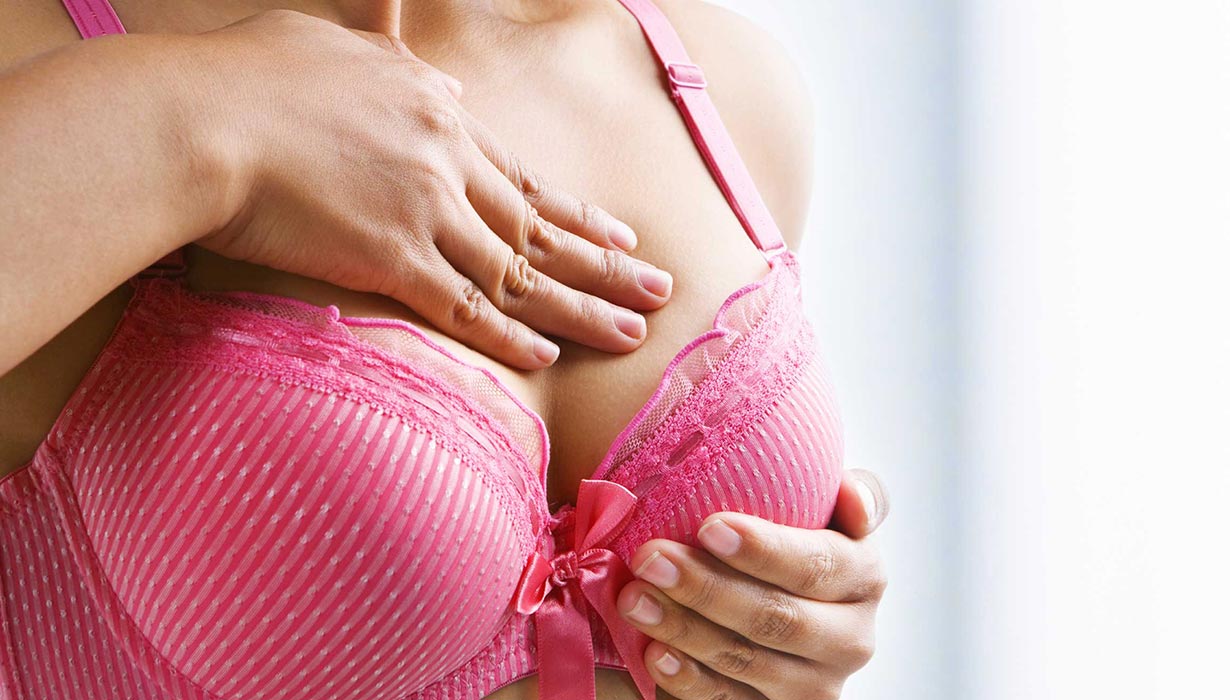Breast Pain: Types, Causes, and Treatment
Posted in Breast Stories | By
Admin Admin

Breast pain is the most common breast abnormality among women. It is also known as Mastalgia. Breast pain attacks women of all ages. About 70% of women experience this pain, and about 15% necessitate medical attention. However, Mastalgia is not always linked to breast cancer. Pain can occur in one breast, in the underarm or even both breasts. Breast pain varies with location, severity, and type.
Types of Mastalgia
1. Cyclic breast pain
It is a dull, heavy, or aching kind of discomfort related to the menstrual cycle. This pain occurs as breast tissues respond to the progesterone and estrogen hormone levels. Pain increases during the 14 days before your period. Sometimes, the pain comes along with some lumpiness and swelling of breasts, a condition known as fibrocystic change. Cyclic breast pain is mostly experienced on both breasts especially the upper outer part. It can also extend to the underarm. Cyclical pain is prevalent in younger women in their 20s and 30s but can also occur in women who are transitioning to menopause.
2. Noncyclic breast pain
It is a tight, sharp burning kind of pain and is not related to the menstrual cycle. This pain mainly occurs on a single breast in a localized part. Though it is common in women after menopause, breast biopsy, a previous breast trauma or injury can also cause a noncyclic breast pain.
Causes of Breast Pain
1. Breast size and structure
Sometimes, mastalgia occurs because of breast size. Large breasts, especially, are likely to undergo a noncyclic breast pain.
2. Breast cysts
They are fluid-filled sacs that develop in breasts. They occur when a woman is going through glands or milk ducts changes in her breasts.
3. Improperly fitted bras
Improper bras can also cause pain. To prevent this, women should wear bras that are neither loose nor too tight.
4. Medications
Drugs that interfere with the hormones are occasionally associated with mastalgia. Such prescriptions include hormone replacement therapy, oral contraceptives, and infertility treatments. Some antidepressants are also likely to cause breast pain, e.g., selective serotonin reuptake inhibitor, SSRI.
5. Breast cancer
Inflammatory breast cancer can be painful though mostly, breast cancer is not associated with pain.
6. Reproductive hormones
They cause most of the pains during pregnancy, menopause or menstrual cycle.
7. Breast surgery
Pain can still occur even when the incisions and scars have completely healed.
8. Mastitis
It is a breast infection that is common in lactating women. This condition occurs as a result of clogged milk duct. Mastitis causes the breasts to appear red, swollen and painful.
9. Imbalance of fatty acids
The fatty acid imbalance in the body can alter the sensitivity levels of breast tissue to circulating hormones causing discomfort.
Self-care Remedies to Manage Mastalgia
One can relieve breasts pains by:
• Applying hot compresses to the affected breast/breasts
• Taking vitamins such as Vitamin E, Vitamin B1, and Vitamin B6
• Consuming a low-fat diet rich in vegetables, grains, and fruits
• Wearing a supportive bra. Also, consider wearing a sports bra when working out.
• Keeping a healthy weight
• Reducing caffeine intake. Beverages such as coffee, chocolates, and tea contain high levels of caffeine.
• Limit sodium intake, e.g., soft drinks
However, it is necessary to see a physician if you experience a nipple discharge, a lump, redness, and fever which could be symptoms of an infection or a continuous pain for more than two weeks.
Treatment of Breast Pain
Drug prescriptions for severe discomforts include bromocriptine and danazol. Pain relief drugs such as Motrin, aspirin, and acetaminophen can be taken to ease the mild pain. Surgery may be necessary in critical cases to remove a tumor or lump.
